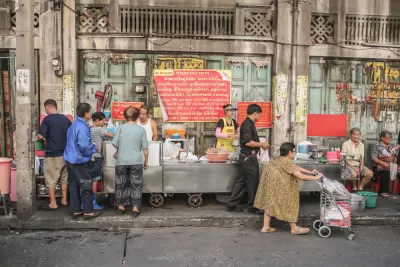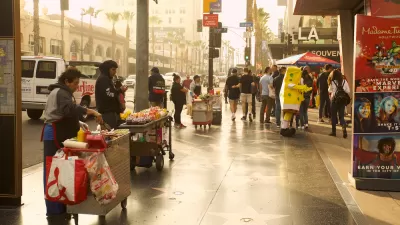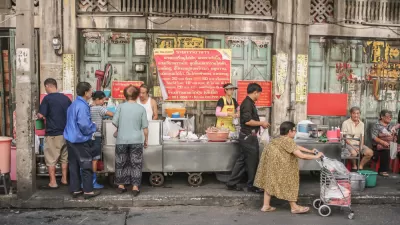Street vending has been a contentious issue in many places, but this part of the informal economy is important to the social and economic well-being of cities.

Sarah Orleans Reed writes about the role of street vending in cities around the world. Street food vendors, for example, offer inexpensive and accessible food in many communities, and street vending is an important source of income and employment for women.
While many cities have cracked down on street vending, often based on the argument that the vendors compete with brick-and-mortar businesses, the evidence shows that they in fact help local economies, says Reed:
In Bangkok, the recent disappearance of street markets badly hurt local storefronts, as well as wholesalers from whom vendors had previously purchased their goods. Businesses in some neighborhoods reported declines of well over half, with many shops relocating and the neighborhoods turning dark, quiet, and more dangerous.
Reed also describes the way Los Angeles and Monrovia, Liberia, have successfully developed policies around street vending, including issuing permits and licenses, collecting taxes and fees, and establishing regulations and enforcement. "L.A. and Monrovia are extremely different in many ways, but they have both made a common, affirmative decision to capitalize on the valuable services that vending provides: creating jobs, increasing access to affordable foods and goods, activating isolated city streets, and stimulating local economies."
Reed’s organization, Women in Informal Employment: Globalizing and Organizing (WIEGO), has also developed a toolkit to help guide local governments through an inclusive planning and policymaking process for street vending.
FULL STORY: Netflix’s ‘Street Food’ Reveals a Thriving and Threatened Culture

Study: Maui’s Plan to Convert Vacation Rentals to Long-Term Housing Could Cause Nearly $1 Billion Economic Loss
The plan would reduce visitor accommodation by 25,% resulting in 1,900 jobs lost.

North Texas Transit Leaders Tout Benefits of TOD for Growing Region
At a summit focused on transit-oriented development, policymakers discussed how North Texas’ expanded light rail system can serve as a tool for economic growth.

Using Old Oil and Gas Wells for Green Energy Storage
Penn State researchers have found that repurposing abandoned oil and gas wells for geothermal-assisted compressed-air energy storage can boost efficiency, reduce environmental risks, and support clean energy and job transitions.

Santa Barbara Could Build Housing on County Land
County supervisors moved forward a proposal to build workforce housing on two county-owned parcels.

San Mateo Formally Opposes Freeway Project
The city council will send a letter to Caltrans urging the agency to reconsider a plan to expand the 101 through the city of San Mateo.

A Bronx Community Fights to Have its Voice Heard
After organizing and giving input for decades, the community around the Kingsbridge Armory might actually see it redeveloped — and they want to continue to have a say in how it goes.
Urban Design for Planners 1: Software Tools
This six-course series explores essential urban design concepts using open source software and equips planners with the tools they need to participate fully in the urban design process.
Planning for Universal Design
Learn the tools for implementing Universal Design in planning regulations.
Ascent Environmental
Borough of Carlisle
Institute for Housing and Urban Development Studies (IHS)
City of Grandview
Harvard GSD Executive Education
Toledo-Lucas County Plan Commissions
Salt Lake City
NYU Wagner Graduate School of Public Service





























